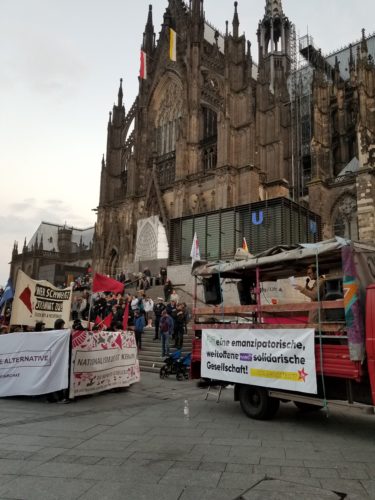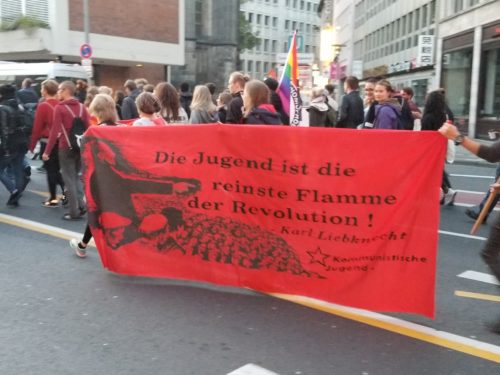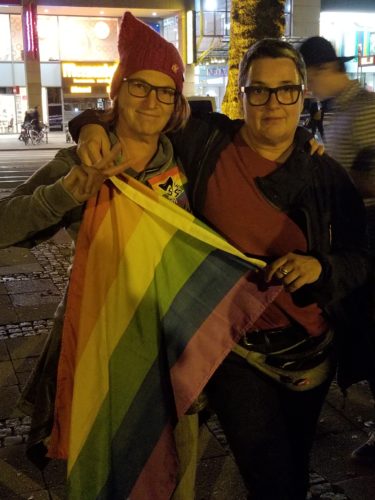By Bobby Reilly
Cologne, Germany – An estimated 400 Germans took to the cobblestoned streets in the historic city of Cologne as the results of their national election became frighteningly clear. These highly organized and passionate protesters were an eclectic bunch. Most were young, some were old; not all shared the same party, attitude or affiliation. But what they all shared, what motivated them to get out on that otherwise beautiful Sunday night, was one unifying idea: hate and fascism must be stopped.
Alternative for Deutschland (AfD) has been a party-on-the-rise in Germany for the past decade, and they have just become the third-largest party in the Bundestag – the German parliament. They have been biding their time, riding the global tide of hyper-nationalism, Euroscepticism, and anti-Muslim rhetoric which has gathered much strength in the recent decade. Their recent victory of 12.6% of the national vote earned them an expected 88 of the 630 seats in the Bundestag and is the first time a far-right political party has been represented in government since the end of WWII.
AfD is described by its critics as neo-Nazi, fascist, and racist. Supporters of the group make the case that the European Union and an open-stance on accepting refugees from the Middle East has led to lower wages and a loss in German national identity. The European Union, an intergovernmental organization which advocates free trade throughout Europe, is used as a scapegoat for any of the economic woes faced by rural, working class Germans. These disillusioned, blue-collar workers have been negatively impacted by the evermore globalized and interconnected world. They are lashing out by clinging to their outdated ideals and by supporting AfD, who promise a return to the old way of things. Sound familiar?
Current co-leader of AfD, Alice Weidel, an openly gay member of a party which opposes rights for same-sex couples, said, “Germany must leave the European Union.” Weidel has also made the case that Islam is a threat to the LGBT communities in an attempt to gain LGBT support. The AfD policy manifesto includes a ban on the construction of Minarets (Islamic prayer towers usually part of a mosque), and includes statements like, “Islam is not part of Germany.” Members of AfD have referred to Berlin’s Holocaust Memorial as a “monument of shame.”
Niels, who would only give me his first name, is a 34 year-old banker who lives and works in Frankfurt, Germany. At the time of our conversation he planned on voting for AfD. His reasoning: “There are Muslim immigrants who are here, and we don’t know what to do with them. Before we let any more in, we should handle the current situation. AfD is about inclusiveness, an open society.”
Niels’ friend Jon, who was standing there listening to our interview, at hearing the words “inclusiveness” and “open society” in the same sentence as “AfD” nearly spit out his Riesling. He managed not to douse me in white wine, and with disbelief in his voice said, “AfD and inclusiveness? They are a hate group!” I was immediately reminded, once again, of the American 2016 presidential election and how words of hate can be warped into words of inclusivity and national pride.

The courtyard where anti-AfD protesters gathered before the march.
So on the afternoon of the election, as the majority of Germans watched in horror at the reality of a fascist resurrection, engaged citizens grabbed their pussy-hats, rainbow flags, and banners and made their way to the Hauptbahnhof (train station). In the courtyard of the station, in the shadow of a 13th century gothic cathedral, gathered the forces which oppose AfD. They were centered on a man who was reading a speech into a megaphone in the bed of an old-fashioned pick-up truck outfitted with signs, stickers and flags. With a police escort clearing the way, the marchers and their amplified truck began the procession into the heart of the city.
The majority of marchers covered their faces with black scarves, hoods, and sunglasses out of fear of retaliation from either government forces or radical AfD members who may recognize them. They were proud yet cautious.
The frustration and shame of these hundreds of individuals were harnessed and transmitted by the waving of rainbow flags, the display of hand-made signs and banners, and the thunderous chants of protest. The collective voice of this mass boomed out anti-capitalist and anti-fascist slogans which echoed through the narrow streets. One of the many banners read, translated from German, “Youth is the purest flame of the revolution!”

“Youth is the purest flame of revolution!”
The march came to a close in The Neumarkt, a large, oval plaza which is surrounded by businesses and is the site of the annual Cologne Christmas Market. By this time the sun had set and the police had disbanded. The marchers maintained with fervor until every last person had arrived safely. Then, one-by-one and group-by-group, they peeled away from the action to return to their forever-changed lives.

German protesters at the close of the march in Neumarkt.
As one might expect, the German people are especially sensitive to the of ideas hyper-nationalism and fascism – these ideas have gotten them into trouble in the past. What was disarming was their blunt acknowledgement of their previous shortcomings, candidly speaking to the faults of their ancestors in the early and mid-twentieth century. They are adamant to ensure the mistakes of their forefathers are not repeated.
Germans are not so different from Americans. There are those who are economically and/or culturally insecure, who direct their frustrations into hate groups under the guise of a return to former glory. There are those of us who take the streets and scream until we are hoarse with the hope of creating a more tolerant and open community. And of course there are those who fall somewhere in the middle; those who are either apathetic or disillusioned or both.
This century is seeing, and will continue to see, the struggle between nationalism and globalism. The world is becoming a much smaller place and the interdependency of nations is inevitable. Will we turn inward, worrying about only ourselves? Can we accept the inevitability of globalization and try to massage the growing pains of progress? The future holds the answer – me must wait and see.




